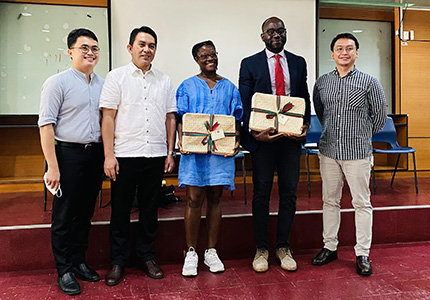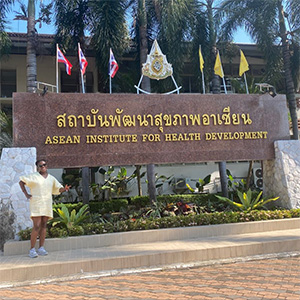Two faculty members in the Department of Epidemiology and Biostatistics—Carmen Tekwe, Ph.D. and Roger Zoh, Ph.D.—recently obtained a "Memorandum of Intent (MOI) for Collaboration between School of Public Health at Indiana University and College of Public Health, University of the Philippines Manila (UP Manila)" to establish continued research to combat health disparities in obesity and the collection of data about type 2 diabetes.
"We signed the MOI in February, and we are now working to become visiting UP faculty to more easily collaborate with their researchers and students—and that is something we are excited about," says Dr. Tekwe. "We have not gotten to the phase of getting data yet as we need to get this next step done first, but the exciting thing is that anyone from IU who is interested in working with the College of Public Health with UP Manila can do that through this agreement."
This is just a small part of a global initiative that Drs. Tekwe and Zoh developed over the course of the last year in Singapore and Thailand, with intentions of extending to Ghana this year. The initiative is designed to help improve collection and analysis of biobehavioral data obtained from wearable devices such as sleep, physical activity, glucose monitoring, and blood pressure—and to see if there are different patterns in various subgroups of people and how those patterns relate to health outcomes.
"We want to know if these patterns only exist within the U.S. or extend beyond our country. Is there something we can do to come up with just one recommendation of how to do this correction across the board?" shares Dr. Tekwe.
This initiative is an extension of the work currently funded by the National Institute of Diabetes and Digestive and Kidney Diseases (NIDDK) to develop measurement error correction methods in physical activity and dietary intake among different subgroups and to see if the same approaches are equally applicable to all individuals - or, if there are needs for more personalized methods that account for other important factors such as culture, climate, and environment.
"There comes a challenge of how to interpret the data coming out—do you use metrics that have been validated here in the U.S. population but don't necessarily translate in the other population in their own cases?" says Dr. Zoh. "This collaboration [with UP Manila] really helps us think more broadly about how to approach data and developing methods that equally benefits all demographics included in the data."
Dr. Tekwe says they will examine whether the U.S. methods for addressing those data issues can be translated to other parts of the world, as well as different demographics. For example, patterns of activity between a 45-year-old White female and a Black female of the same age might be different for reasons other than racial differences—and might require other methods of data collection and improvement.
"There are so many other issues that create these differences in individuals beyond race and we are trying to explore this a bit further and find out what those things are," says Dr. Tekwe.




